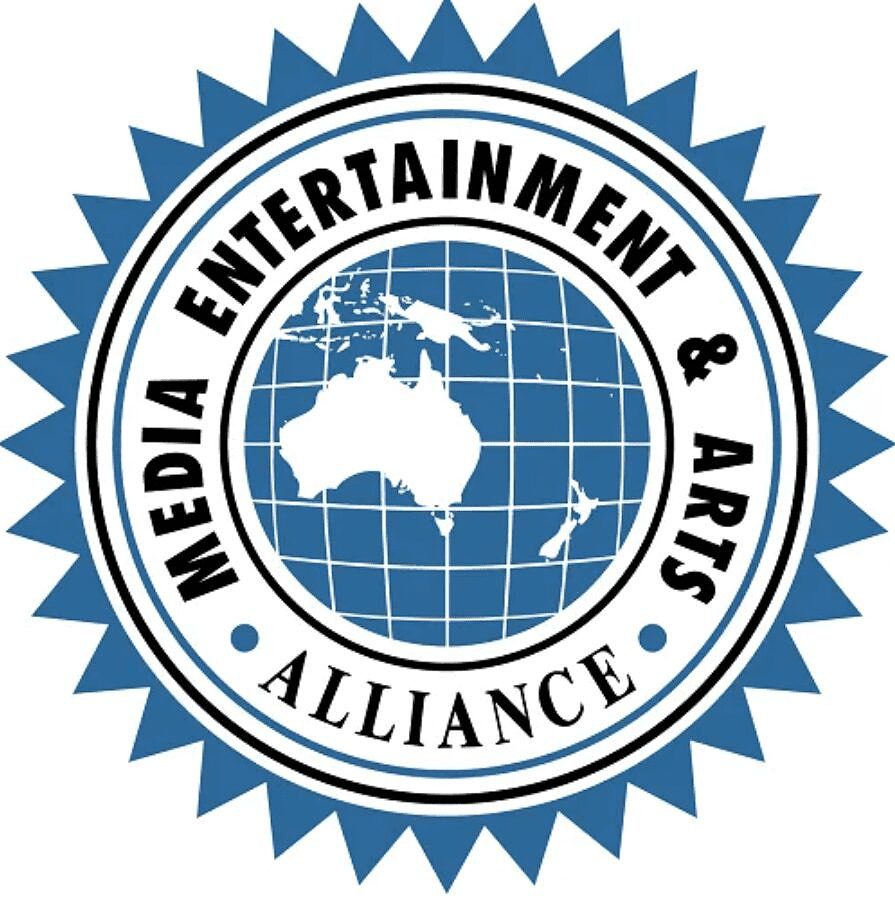The nation’s media union, just like the public, has been stitched-up by Nine Entertainment. Relying on a meaningless statement – a handful of legalistic weasel words – the MEAA dropped its campaign to ensure editorial independence at the former Fairfax mastheads. Nine’s manoeuvring has now been exposed. What the MEAA does from here will be closely watched. Anthony Klan reports.
Appreciate our quality journalism? Please donate here
EXCLUSIVE
It was the biggest consolidation of Australia’s media in decades. A monster $4.2 billion takeover of the 177 year-old Fairfax by free-to-air TV giant Nine Entertainment.
The move would be hugely detrimental to media diversity in Australia, where media ownership was already more concentrated than almost anywhere else in the western world.
Hundreds of jobs were on the line, Fairfax journalists were protesting, and there was a public outcry.
Former prime minister Paul Keating, a prominent critic of Nine, said Fairfax’s papers would be consigned “to the ethical dustbin of Channel Nine”.
Denis Muller, senior research fellow at the University of Melbourne’s Centre for Advancing Journalism, said the takeover meant “the death of Fairfax” and was the “most consequential change in Australian media ownership in 31 years”.
The media union, the Media Entertainment and Arts Alliance, was unequivocal.
“Until Peter Costello…formally signs a binding document that commits Nine to adopting the charter of independence, our members will continue to be concerned and sceptical about how genuine Nine’s commitment to editorial independence really is”
— MEAA’s Marcus Strom, 2018
The takeover threatened editorial independence at the Fairfax newspapers, undermined quality journalism and threatened the “functioning of a healthy democracy”, MEAA Media federal president Marcus Strom said when it was announced on July 26, 2018.
“Today’s takeover announcement is the inevitable result of the Coalition’s Government’s short-sighted and ill-conceived changes to media ownership laws that were always going to result in less media diversity.
“It harms the ability of an independent media to scrutinise and investigate the powerful, threatens the functioning of a healthy democracy, undermines the quality journalism that our communities rely on for information,” he said.
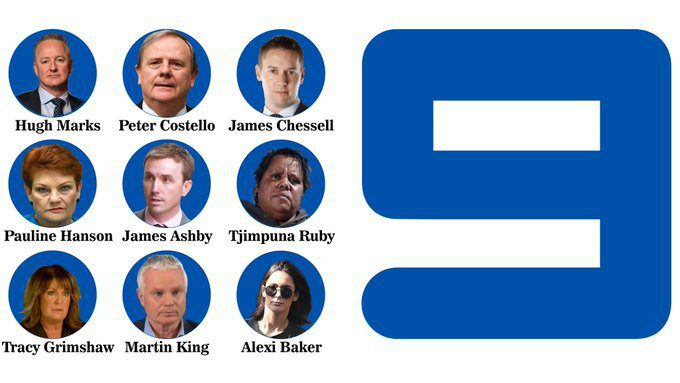
How The Klaxon broke the story last week. Source: HS
At Fairfax, a charter was in place that was aimed at preventing media proprietors from interfering in editorial decisions.
The Fairfax Charter of Editorial Independence was implemented between 1988 and 1991 and had covered staff at The Sunday Age, The Sydney Morning Herald, The Sun-Herald and The Australian Financial Review.
It stated, among other things, that journalists at Fairfax publications must report “fairly, fully and regardless of any commercial, political or personal interests,” including those of “any proprietors, shareholders or board members”.
As revealed by The Klaxon last week, Nine never actually signed the Fairfax Charter of Editorial Independence, despite bluffing and leading the public to believe it had done so.
(The charter no longer exists in any real sense, because it wasn’t signed by Nine it expired when Nine took over Fairfax. It exists only on an eight-year-old Fairfax webpage, and Nine has never reproduced the charter or provided it to its employees).
Nine’s chairman is Peter Costello, the former LNP Federal Treasurer.
Concerns have been raised about political interference at the former Fairfax papers since the Nine takeover.
——————————————————
More on Nine:
Nine-Fairfax “Independence Charter” a sham
Indigenous “group” created days before Nine’s Hanson stitch-up
Nine’s papers in major “independence” test: stumble hopelessly
SCOOP: Hanson’s Uluru “climb” a monolithic stitch up
———————————————————
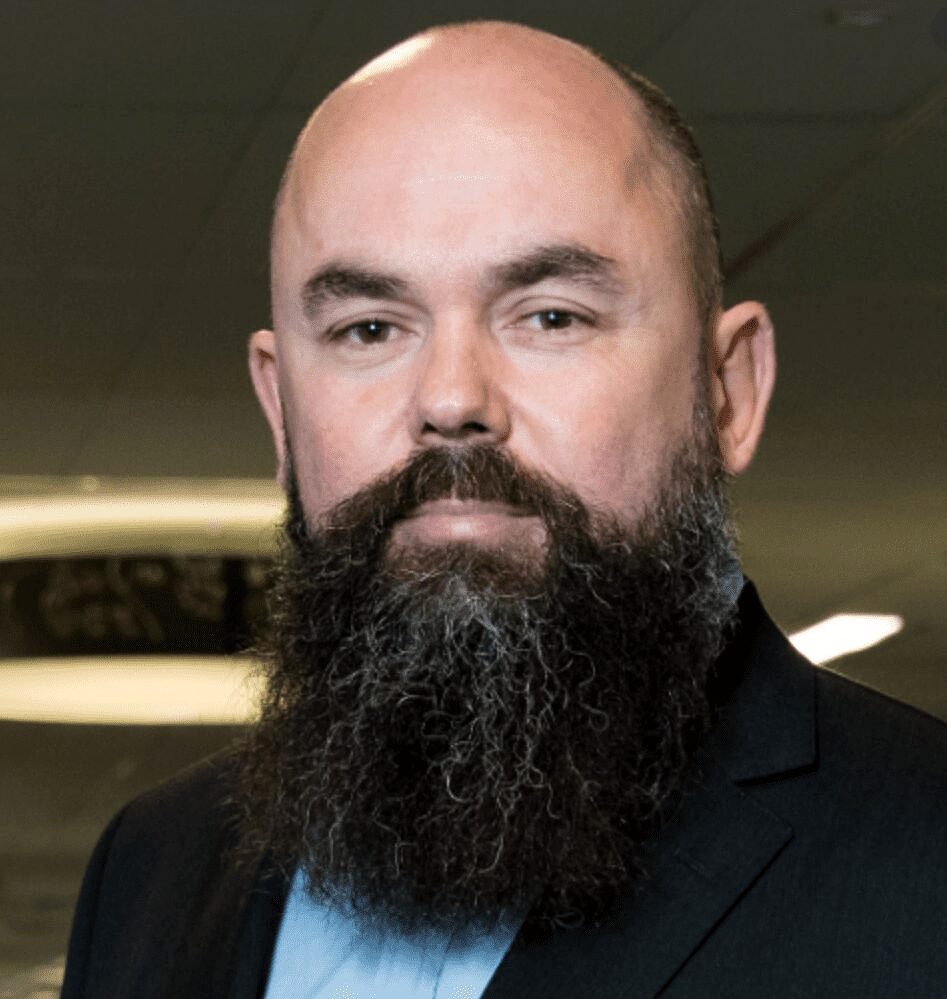
Marcus Strom. MEAA media, federal president. Source: Twitter
MEAA campaign
On July 27, 2018, the day after the takeover was announced, Strom called for a “written guarantee” that the “full wording” and “intent of the current charter” would be retained.
The MEAA said it would “continue to seek a written guarantee that the full wording and intent of the current charter will be adopted by the enlarged company should the takeover go ahead”.
On July 30 the MEAA issued a statement saying “key questions remained unresolved” about how “editorial independence would be protected following the proposed takeover of Fairfax”.
“Nine chairman Peter Costello and his board must commit in writing to the full wording and intent of the Fairfax Charter of Editorial Independence,” the MEAA said.
Strom said Nine had a tradition of “great journalism”, but without a commitment in writing, Fairfax staff had every right to be concerned about whether the charter would be adopted if the takeover went ahead.
“The Fairfax charter of independence, established in 1991 when the company was facing an earlier takeover, explicitly prohibits media owners from dictating or interfering in the editorial decisions or journalism of its publications, even if they may reflect poorly on the proprietor or advertisers,” Strom said.
“Until Peter Costello, who would be chair of the new merged entity, formally signs a binding document that commits Nine to adopting the charter of independence, our members will continue to be concerned and sceptical about how genuine Nine’s commitment to editorial independence really is.”

The independence charter Nine never signed – and is still refusing to. Source: Supplied.
Such a document has never been signed by Costello, or anyone else at Nine.
On November 8, 2018, the Australian Competition and Consumer Commission said it would not oppose the takeover, despite chair Rod Sims saying it would “likely reduce competition” and that Australia would be “slightly worse off”.
The MEAA responded that day, saying the ACCC approval was a “body blow to media diversity” and a “body blow to journalism”.
“Given the ACCC’s failure to take the concerns raised by MEAA and the public into account, we will be making a robust case to the new owners of Fairfax to sign a new charter of independence,” MEAA chief executive Paul Murphy said on November 8, 2018.
On December 7, 2018, hours after the takeover occurred, the MEAA released a statement saying serious issues remained unresolved.
“When the takeover was first announced, we sought three commitments from Nine’s management, and these remain outstanding issues in the wake of Nine’s takeover,” the statement said.
“1. Nine’s chairman Peter Costello, the board of directors and Nine’s CEO Hugh Marks must commit to and sign the Fairfax Charter of Editorial Independence that all owners have signed up to over the past 30 years”.
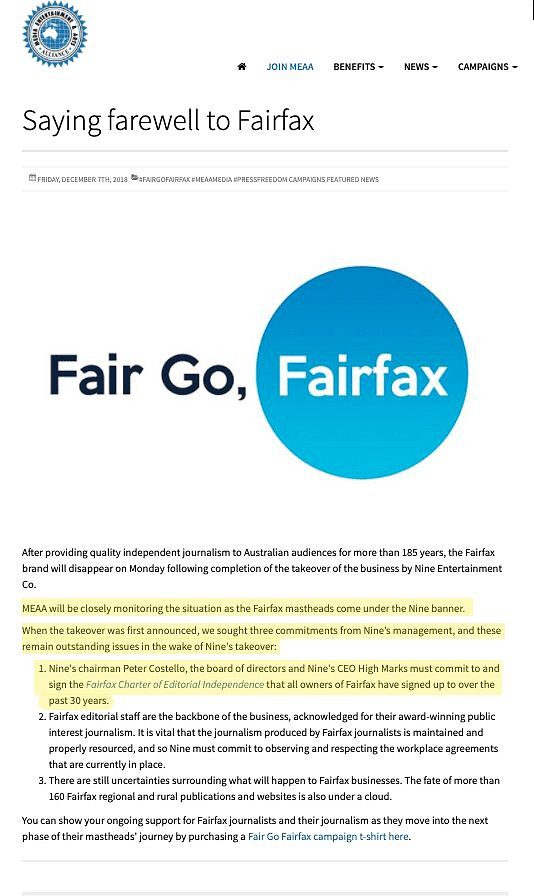
After the takeover the MEAA says Costello and Nine’s failure to “commit to and sign” the Fairfax charter remains outstanding. Source: MEAA
What changed?
MEAA CEO Murphy never made a “robust case to the new owners of Fairfax” to “sign a new charter of independence”.
The opposite occurred: the MEAA changed its tune.
Two weeks ago, media national president Marcus Strom told The Klaxon the MEAA was now relatively satisfied about the charter of independence.
On December 4, 2018, before the takeover, the MEAA sent to Nine a letter via email.
The same three issues the MEAA had raised when the takeover was announced remained outstanding.
On December 11 2018, a week later and after the takeover, Nine responded, emailing a letter to Murphy and Strom.
Strom considered that letter put the matter to bed and ensured the integrity of the Fairfax charter.
It was the “last correspondence” the MEAA had had with Nine in relation to the matter.
We received a copy.
It actually gives zero assurances of the type suggested by Strom.
Just like every other vague statement Nine had made since announcing the takeover, it was a legal fudge.
It is the type of classic fudge corporate lawyers engage in to fool regulators and to maximise their profits.
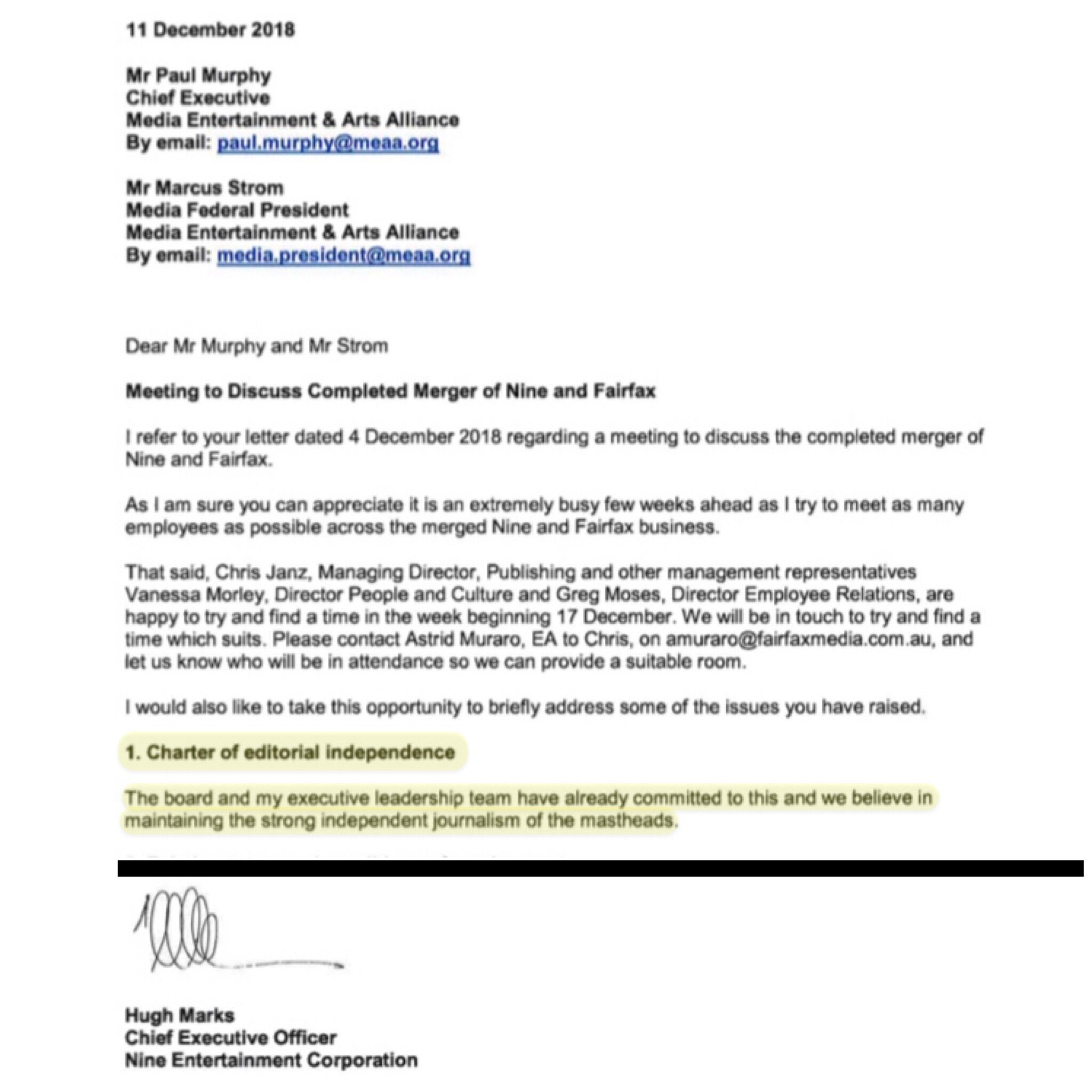
Part of the two-page letter from Nine to the MEAA, December 11, 2018. Source: Supplied
The letter from Marks carries a sub-heading: “1. Charter of Editorial Independence”, followed by a single sentence.
“The board and my executive leadership team have already committed to this and we believe in maintaining the strong independent journalism of the mastheads.”
That simply reiterates the earlier fudging.
That is, Nine is pointing to its earlier statements, made before the takeover, when Nine had no ownership of Fairfax and was not in any position to enter a contract with its journalists.
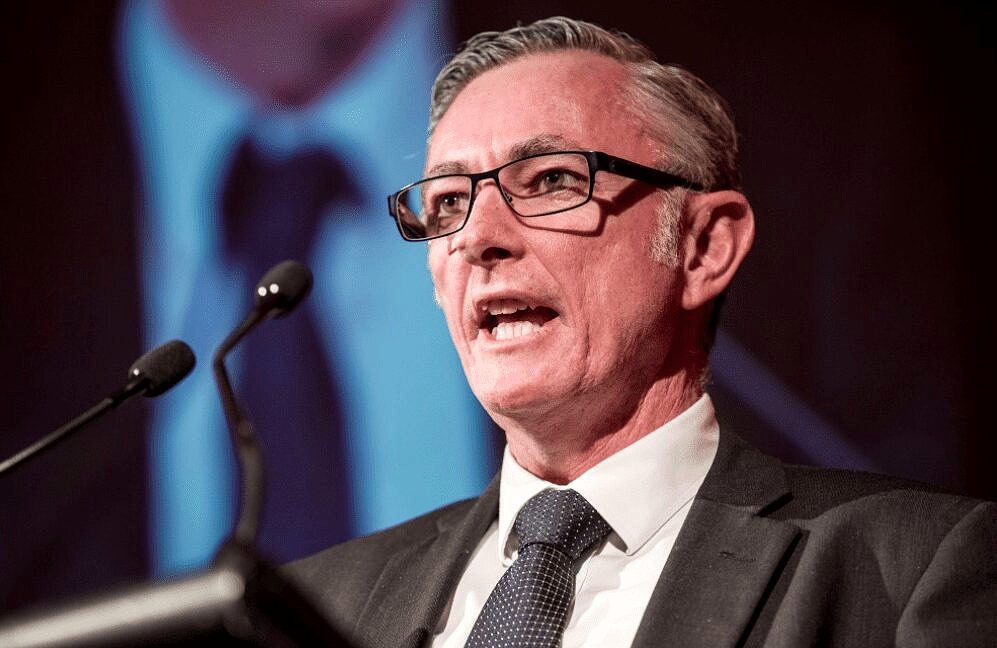
MEAA CEO Paul Murphy. Source: MEAA
The MEAA, apparently, completely missed this.
In December 4 letter the MEAA had written to Nine requesting a meeting and assurances around the three outstanding key concerns.
They were that the merged entity would not see staff numbers cut, that the then current Fairfax enterprise bargaining agreement remain in place, and that the Nine board sign the Fairfax Charter of Editorial Independence.
In the response, a week later and four days after the takeover, Nine CEO Hugh Marks said that he was too busy to meet with the MEAA.
Chris Janz, Nine’s managing director of publishing; Nine’s Human Resources director Vanessa Morley; and Greg Moses, Nine’s director of employee relations, would be willing to meet in about a week’s time, during the week beginning December 17.
But at that meeting, rather than making a “robust case” to the “new owners of independence to sign a new charter of independence”, the MEAA representatives barely raised the issue.
Rather, Strom told us last week, he and the other MEAA representatives had discussed other matters such as the “transmission and continuity of enterprise agreements, things like long-service leave”.
The MEAA appears to have been badly caught out.
It’s a sizeable organisation.
At June 30 it had 15,494 members (of which 5109 were media members) and 64 employees, with six of those earning over $140,000 a year.
The MEAA hasn’t issued a single media statement on its website since last week’s expose in The Klaxon.
The question for the MEAA will be how it responds given it appears it too – like the public and Nine’s audiences – has been seriously misled by Costello’s Nine.
The stitch-up by Nine wouldn’t have made any difference to the takeover occurring – it sailed through on December 7 2018, despite the MEAA’s strong objections at the time.
But the fudge of December 11 2018 has allowed Nine to avoid a great deal of public scrutiny and pressure.
The question, post-takeover, was always going to be – has Nine signed the independence charter?
The weasel words from Marks to the MEAA on December 11 2018 all but snuffed out that question and public debate.
Until now anyway.
Help us get the truth out from as little as $10/month.
Unleash the excitement of playing your favorite casino games from the comfort of your own home or on the go. With real money online casinos in South Africa, the possibilities are endless. Whether you’re into classic slots, progressive jackpots, or live dealer games, you’ll find it all at your fingertips. Join the millions of players enjoying the thrill of real money gambling and see if today is your lucky day!
The need for fearless, independent media has never been greater. Journalism is on its knees – and the media landscape is riddled with vested interests. Please consider subscribing for as little as $10 a month to help us keep holding the powerful to account.


